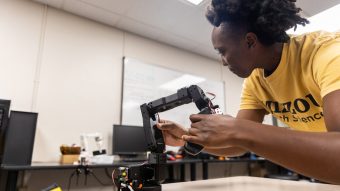Nov. 4, 2021
Professors in the Finance Department at the University of Missouri Trulaske College of Business are publishing research that’s shaping the future of investing and trading. Here’s a look at four researchers and their findings.
Stocks are riskier than you think
Conventional wisdom is that stocks are a safe investment for the long run. But there’s a problem with this investing advice — according to Michael O’Doherty, professor in the Finance Department: The research behind it includes less than 100 years of U.S. return history.
To help fill a gap in research, O’Doherty and team collected information about stock returns from 39 developed countries from 1841 to 2019. They found a more than 10% difference in projected loss of money during a 30-year period when using global data compared to U.S.-only data.
“The obvious implication is that stocks are riskier than you think,” O’Doherty said.
Predicting stock returns from news photos
A picture is worth a thousand words. But how much is it worth in the stock market?
Professor of Finance Kuntara Pukthuanthong and team used machine learning to go through millions of photos at relative ease. They found when pessimism embedded in news photos is high, irrational investors will increase their demand for assets — driving up prices away from fundamentals. As a result, rational investors will take advantage of mispricing, leading prices to return to their fundamental levels.
How fear influences investors
Assistant Professor of Finance Michael Young found when investors experience fear, they flee. By studying terrorist activity in the U.S. over the past three decades, Young and his co-author show an increase in the number of attacks each month leads to investors moving money directly out of equity funds and into government bond funds within the same fund families.
The researchers not only show investors experience a change in risk aversion after a terrorist attack, but they also prove negative emotions such as fear, anxiety or depression — not changes in wealth or the outside environment — are what is driving their investment decisions.
The importance of Cushing, Oklahoma
A lot of finance researchers study crude oil prices and the relationship between spot and futures prices. Assistant Professor Kate Holland, however, is interested in the physical component of crude oil storage. While there are many other crude oil storage facilities in the U.S., Cushing is only the delivery point for New York Mercantile Exchange futures crude oil contracts.
“If there’s a really wide spread between the prices, people will put oil into storage to take advantage of cash-and-carry arbitrage,” Holland said. “What was interesting is that we showed arbitrage-related crude oil inventory movements only happen in Cushing.”
When there is enough storage, these arbitrage-induced inventory movements are price stabilizing: Oil goes into storage in Cushing when prices are relatively low and comes out when prices are relatively high, moderating price swings.




